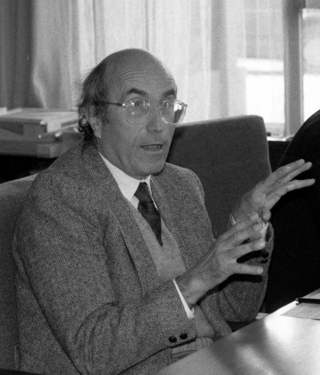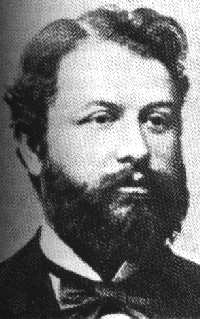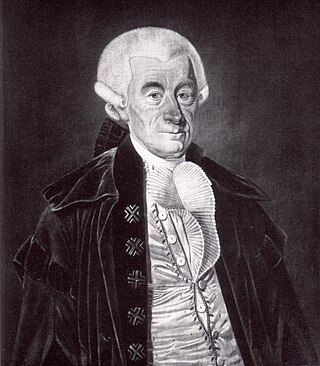
Gustav Radbruch was a German legal scholar and politician. He served as Minister of Justice of Germany during the early Weimar period. Radbruch is also regarded as one of the most influential legal philosophers of the 20th century.

Jurisprudence, also known as theory of law or philosophy of law, is the examination in a general perspective of what law is and what it ought to be. It investigates issues such as the definition of law; legal validity; legal norms and values; as well as the relationship between law and other fields of study, including economics, ethics, history, sociology, and political philosophy.

Niklas Luhmann was a German sociologist, philosopher of social science, and a prominent thinker in systems theory.
In jurisprudence and legal philosophy, legal positivism is the theory that the existence of the law and its content depend on social facts, such as acts of legislation, judicial decisions, and customs, rather than on morality. This contrasts with natural law theory, which holds that law is necessarily connected to morality in such a way that any law that contradicts morality lacks legal validity.
Pure Theory of Law is a book by jurist and legal theorist Hans Kelsen, first published in German in 1934 as Reine Rechtslehre, and in 1960 in a much revised and expanded edition. The latter was translated into English in 1967 as Pure Theory of Law. The title is the name of his general theory of law, Reine Rechtslehre.

Georg Jellinek was a German public lawyer and was considered to be "the exponent of public law in Austria“.

Julius Binder was a German philosopher of law. He is principally known as an opponent of legal positivism, and for having remained as an active scholar during the 1930s in Nazi Germany who did not speak out against the prevailing government of that time.
Gertrude Lübbe-Wolff is a German academic and senior judge. She served as a justice of the second senate of the Bundesverfassungsgericht from 2002 to 2014, having succeeded Jutta Limbach in this position.
Glenn Warren Most is an American classicist and comparatist originating from the US, but also working in Germany and Italy.

Johann Stephan Pütter was a German law lecturer and publicist. He was professor of law at the university of Göttingen from 1746 until his death. He exerted great influence on the law institutions of his time. His principal work is Historische Entwicklung der heutigen Staatsverfassung des Deutschen Reichs.
The Radbruch formula is a legal theory which was first formulated in a 1946 essay by the German law professor and politician Gustav Radbruch. According to the theory, a judge who encounters a conflict between a statute and what he perceives as just, has to decide against applying the statute if—and only if—the legal concept behind the statute in question seems either "unbearably unjust" or in "deliberate disregard" of human equality before the law.

Andreas Dorschel is a German philosopher. Since 2002, he has been professor of aesthetics and head of the Institute for Music Aesthetics at the University of the Arts Graz (Austria).
Markus Mühling is a Protestant systematic theologian and philosopher of religion whose work focuses largely on the doctrine of God, eschatology, the atonement and the dialogue between the natural sciences and theology.
Anne Peters is a German-Swiss jurist with a focus on public international law. She is director at the Max Planck Institute for Comparative Public Law and International Law, honorary professor at the University of Basel, University of Heidelberg and Free University of Berlin, and at William W. Cook Global Law Professor at Michigan Law School.
The Göttingen Faculty of Theology is the divinity school at the University of Göttingen, officially denominated the "United Theological Departments" but commonly referred to as the "Theological Faculty" . It was instituted at the foundation of the University, in 1737, along with the three other original faculties of Law, Medicine, and Philosophy. Over the centuries, the Göttingen Faculty of Theology has been home to many influential scholars and movements, including the rise of historical criticism, Ritschlianism, the History of Religions School, and Dialectical Theology. Its members were also involved in the Göttingen school of history.

Karl Engisch was a German jurist and a Philosopher of Law. He was described by Hans Joachim Hirsch as one of the "outstanding theorists of criminal justice of the [twentieth] century".

Alexander Somek is an Austrian legal scholar.

Walter Hinck was a German Germanist and writer. He was professor of German literature at the University of Cologne from 1964 to 1987.
A legal norm is a binding rule or principle, or norm, that organisations of sovereign power promulgate and enforce in order to regulate social relations. Legal norms determine the rights and duties of individuals who are the subjects of legal relations within the governing jurisdiction at a given point in time. Competent state authorities issue and publish basic aspects of legal norms through a collection of laws that individuals under that government must abide by, which is further guaranteed by state coercion. There are two categories of legal norms: normativity, which regulates the conduct of people, and generality, which is binding on an indefinite number of people and cases. Diplomatic and legislative immunity refers to instances where legal norms are constructed to be targeted towards a minority and are specifically only binding on them, such as soldiers and public officials.

Jens Hacke is a German political scientist and author.











